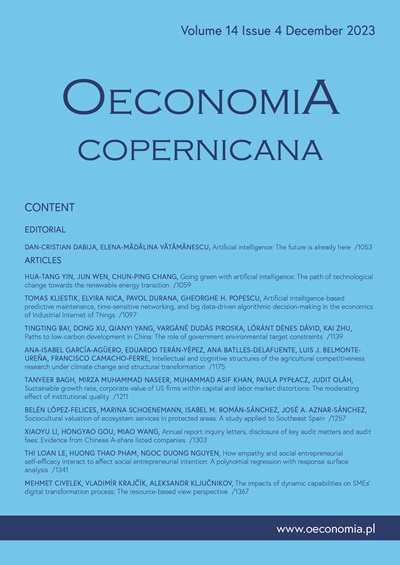Impact of enterprise ambidexterity capability and experience learning on cross-border M&A performance: evidence from China
IF 10.8
1区 经济学
Q1 ECONOMICS
引用次数: 1
Abstract
Research background: Through cross-border mergers and acquisitions (M&A), enterprises in China can improve their technological innovation and organizational management capabilities to make up for the disadvantages of outsiders and enhance their international competitiveness. However, due to the lack of experience, the success rate of cross-border M&A of China enterprises is low, and the performance changes after M&A differ. How to maximize the advantages of cross-border M&A in obtaining technical resources and how to improve the performance of cross-border M&A are important issues that China?s cross-border M&A enterprises and academic circles need to solve. Purpose of the research: The aim of this study is to analyze the mechanism and boundary conditions of firms? capability to exploit resources (RTC) and capability to explore resources (REC) with regard to cross-border M&A performance from the perspective of experience learning based on organizational learning theory and resource-based theory. Methods: With 173 China A-share listed companies with cross-border M&A events from 2010 to 2020 as samples, this study uses hierarchical regression analysis to test the impact of REC and RTC on cross-border M&A performance and its mechanism. In the robustness test, this study adopts the measures of changing dependent and independent variables lagged for one year for analysis. In the mechanism test, this study uses intermediary and mediation effect models. Findings & value added: The results show that RTC and REC have positive effects on the performance of cross-border M&A. Prior experience learning (PE) and vicarious experience learning (VE) increase the probability of companies making cross-border M&A decisions and have positive effects on cross-border M&A performance. Moreover, PE and VE play a partial mediating role in the positive impact of REC and RTC on cross-border M&A performance, respectively. Formal and informal institutional distance weaken the positive effects of REC and RTC on the performance of cross-border M&A. Enterprises in emerging economies should adapt to the institutional environment of the host country to reduce the negative impact of institutional distance while taking advantage of experience learning when carrying out cross-border M&A.企业双元能力和经验学习对跨国并购绩效的影响:来自中国的证据
研究背景:中国企业通过跨国并购可以提高自身的技术创新能力和组织管理能力,弥补外来者的劣势,增强国际竞争力。然而,由于缺乏经验,中国企业跨境并购的成功率较低,并购后的绩效变化也不尽相同。如何最大限度地发挥跨国并购在获取技术资源方面的优势,如何提高跨国并购绩效,是中国面临的重要问题。跨国并购企业和学术界需要解决的问题。研究目的:本研究的目的是分析企业发展的机制和边界条件。基于组织学习理论和资源基础理论的经验学习视角下的资源开发能力(RTC)和资源探索能力(REC)对跨国并购绩效的影响。方法:以2010 - 2020年发生跨国并购事件的173家中国a股上市公司为样本,采用层次回归分析方法,检验REC和RTC对跨国并购绩效的影响及其作用机制。在稳健性检验中,本研究采用改变滞后一年的因变量和自变量的方法进行分析。在机制检验中,本研究采用中介效应模型和中介效应模型。研究结果与增加值:研究结果表明,RTC和REC对跨国并购绩效有正向影响。先验经验学习(PE)和替代经验学习(VE)增加了企业进行跨国并购决策的概率,并对跨国并购绩效产生正向影响。此外,PE和VE分别在REC和RTC对跨国并购绩效的正向影响中起部分中介作用。正式制度距离和非正式制度距离削弱了区域合作与区域合作对跨国并购绩效的正向影响。新兴经济体企业在进行跨国并购时应适应东道国的制度环境,减少制度距离的负面影响,同时利用经验学习的优势。
本文章由计算机程序翻译,如有差异,请以英文原文为准。
求助全文
约1分钟内获得全文
求助全文
来源期刊

Oeconomia Copernicana
ECONOMICS-
CiteScore
13.70
自引率
5.90%
发文量
26
审稿时长
24 weeks
期刊介绍:
The Oeconomia Copernicana is an academic quarterly journal aimed at academicians, economic policymakers, and students studying finance, accounting, management, and economics. It publishes academic articles on contemporary issues in economics, finance, banking, accounting, and management from various research perspectives. The journal's mission is to publish advanced theoretical and empirical research that contributes to the development of these disciplines and has practical relevance. The journal encourages the use of various research methods, including falsification of conventional understanding, theory building through inductive or qualitative research, first empirical testing of theories, meta-analysis with theoretical implications, constructive replication, and a combination of qualitative, quantitative, field, laboratory, and meta-analytic approaches. While the journal prioritizes comprehensive manuscripts that include methodological-based theoretical and empirical research with implications for policymaking, it also welcomes submissions focused solely on theory or methodology.
 求助内容:
求助内容: 应助结果提醒方式:
应助结果提醒方式:


